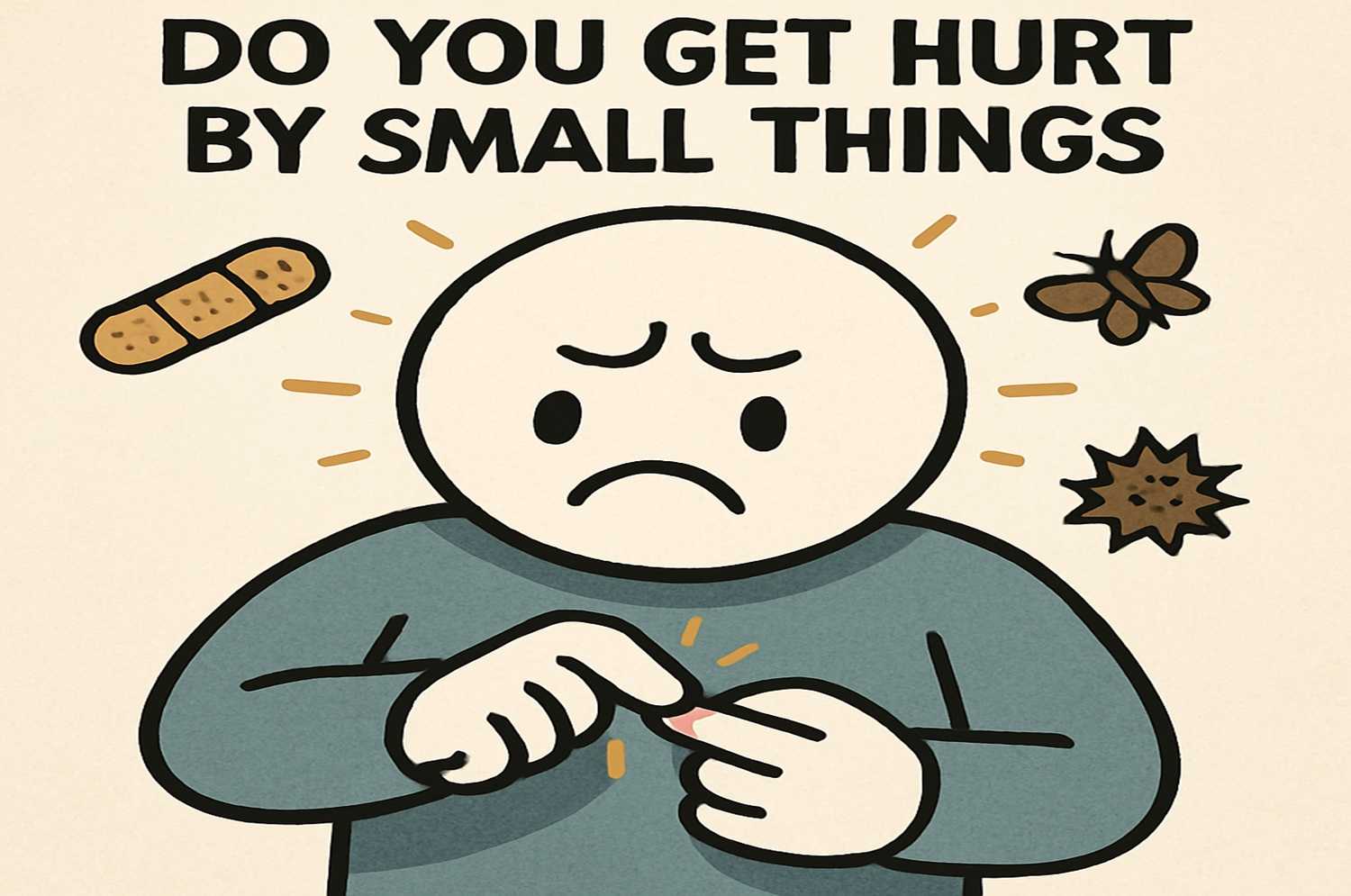Do you ever feel like a small comment ruins your whole day? You’re not alone. Many people experience deep emotional reactions to seemingly minor events. In this guide, we’ll explore why this happens, what it says about your emotional well-being, and how you can stop letting small things hurt so much.
Table of Contents
ToggleWhy Small Things Hurt So Much
It can be confusing — even frustrating — to feel deeply affected by small remarks, actions, or events. But the pain isn’t random. It often comes from deeper emotional patterns or unhealed parts of ourselves. Let’s explore what might really be happening beneath the surface:
High Sensitivity and Emotional Triggers
Some people are naturally more emotionally sensitive. This isn’t a weakness — it’s a trait. Highly sensitive individuals (HSPs) have nervous systems that respond more intensely to stimuli. A passing comment or subtle change in tone might feel overwhelming because your brain processes emotions at a deeper level. When sensitivity meets emotional triggers, even a minor situation can feel like a storm.
Past Trauma or Unhealed Wounds
Unresolved emotional pain from the past can quietly shape our reactions. If someone ignored you as a child, a friend’s silence today might reopen that wound. These aren’t just “overreactions” — they’re survival patterns built to protect you. Small things hurt more when they echo something much bigger you’ve been carrying for a long time.
Low Self-Esteem or Negative Self-Talk
When your inner critic is loud, even mild external criticism feels like confirmation of your worst fears. A tiny mistake, a delay in someone’s reply, or a careless word might feel devastating because you’ve already been telling yourself you’re not good enough. In such a mental environment, even small experiences can feel like proof of failure or rejection.
Overthinking and Mental Patterns
Your brain is designed to find meaning — but sometimes it works overtime. If you tend to overanalyze situations, a small event can spiral into a mental loop. You might replay a moment again and again, assigning negative intent where there was none. Overthinking fuels emotional pain, making minor events feel major and exhausting.
Signs You May Be Emotionally Overreacting
Even the most emotionally intelligent people can sometimes overreact without realizing it. Emotional overreaction isn’t just about yelling or crying—it can also show up in subtle mental and behavioral patterns. Here are a few key signs that may indicate you’re emotionally overreacting:
You Replay Minor Incidents for Hours
If you find yourself constantly rethinking a simple conversation or a small disagreement, you might be emotionally amplifying the situation. Overanalyzing harmless remarks or perceived slights is a common sign that your brain is stuck in a cycle of emotional overprocessing. This can drain your energy, spike anxiety levels, and prevent you from moving forward.
Expert Insight: Our minds tend to linger on emotionally charged moments, but when replaying becomes obsessive, it’s worth exploring why certain triggers hit harder than others.
You Take Things Too Personally
Do you often feel attacked or criticized—even when someone isn’t targeting you directly? Taking things personally is a classic symptom of emotional overreaction. It usually stems from low self-esteem, unresolved wounds, or hypersensitivity to perceived judgment.
Real-Life Scenario: A coworker gives neutral feedback on your presentation, and you instantly feel embarrassed or defensive. The reaction may have more to do with internal insecurities than the actual comment.
You Frequently Feel Misunderstood
When you often feel like “nobody gets you,” it might not always be about others’ inability to understand—it could be your heightened emotional state creating distance. Feeling misunderstood can lead to isolation, resentment, and communication breakdowns.
Human Touch: Emotional overreactors often crave deeper connection, but their intensity can sometimes push others away, creating a self-fulfilling cycle.
How to Stop Getting Hurt by Small Things
Practice Emotional Awareness
To stop being hurt by small things, the first step is recognizing how you react emotionally. Often, our triggers are rooted in past experiences or insecurities. Practice tuning in to your feelings instead of dismissing or judging them. Journaling, reflective pauses, or simply asking yourself, “Why did that upset me?” can lead to emotional breakthroughs and better control over your reactions.
Reframe Negative Thoughts
Negative thinking distorts reality and magnifies small events. If a comment or gesture feels hurtful, pause and reframe it. Ask: Is this really about me? or Is this worth the energy? Replace thoughts like “They’re ignoring me” with “Maybe they’re just busy.” Cognitive reframing builds resilience and helps you interpret situations more calmly and rationally.
Set Healthy Emotional Boundaries
You’re not responsible for other people’s moods or opinions. Setting emotional boundaries means choosing what you allow to affect your peace. It’s okay to say no, take space, or limit interactions that drain you. Boundaries aren’t walls—they’re filters that protect your emotional well-being.
Build Self-Worth with Daily Habits
When you value yourself, small slights lose their power. Build your self-worth through consistent habits: speak kindly to yourself, celebrate small wins, practice gratitude, and avoid comparing yourself to others. Confidence is not loud—it’s steady and built one habit at a time.
Learn Mindfulness and Stress Management
Mindfulness teaches you to respond, not react. Deep breathing, meditation, or even short walks can anchor your nervous system and reduce reactivity. Stress makes you more sensitive, so managing it through regular movement, quality sleep, and mindful pauses can prevent overreactions and promote inner calm
How to Stop Getting Hurt by Small Things
Practice Emotional Awareness
Emotional awareness is the key to breaking the cycle of overreacting to small slights or everyday frustrations. Start by observing your inner dialogue and physical responses when you feel hurt. Are you catastrophizing, assuming the worst, or personalizing others’ actions? These patterns often stem from unresolved emotional wounds or unmet needs. Journaling, mindfulness, or simply pausing before reacting can help you name your feelings and trace them back to their root. The more aware you are of what triggers your pain, the more control you gain over your emotional reactions.
When to Seek Help from a Professional
Persistent Emotional Pain
If small incidents repeatedly cause you intense distress or emotional shutdown, it may signal deeper issues that need attention. Therapy can help uncover underlying beliefs, past traumas, or patterns that keep you stuck in a cycle of hurt. Persistent pain is a sign you don’t have to keep ignoring—professional support offers tools to heal and cope more effectively.
Symptoms of Anxiety or Depression
Frequent emotional overreactions may not be about “being too sensitive” but could indicate anxiety or depression. If you’re experiencing constant worry, mood swings, loss of interest, or fatigue alongside being easily hurt, it’s important to consult a mental health expert. These symptoms are treatable, and early intervention can make a big difference in your well-being.
Difficulty Functioning in Daily Life
When emotional pain starts affecting your work, relationships, or ability to enjoy life, it’s time to seek help. Emotional resilience isn’t about never feeling pain—it’s about managing it in ways that don’t disrupt your daily living. A professional can guide you in developing healthier coping strategies, building emotional strength, and creating lasting change.
Read Also:
Schizophrenia Explained: Symptoms, Causes & Life-Changing Treatments
Worried All the Time? These Proven Tips Can Help You Relax
FAQ:
Why do small things hurt me so much emotionally?
You may be highly sensitive, have past trauma, or struggle with low self-worth or overthinking.
Is it normal to feel deeply hurt by small things?
Yes, but when it disrupts daily life, emotional regulation techniques or therapy can help.
How can I become emotionally stronger?
Practice self-awareness, shift your mindset, build confidence, and learn coping strategies like mindfulness.
Can therapy help me stop overreacting emotionally?
Absolutely. Cognitive Behavioral Therapy (CBT) and talk therapy are effective in reframing thought patterns.
Are sensitive people weak?
Not at all. Sensitivity is a strength when balanced with emotional resilience and self-compassion.










1 thought on “Do You Get Hurt by Small Things? The Psychology Behind It”